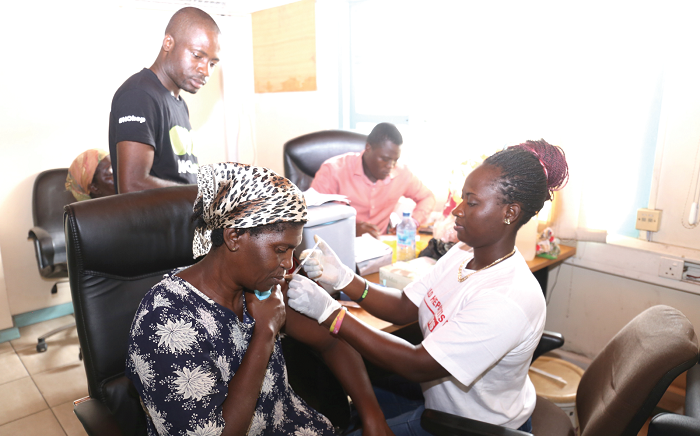
Rising incidence of Hepatitis B among youth worrying — Owusu-Ansah
The president of Hepatitis Foundation of Ghana, Mr Theobald Owusu-Ansah, has expressed worry at the rising incidence of Hepatitis B among the youth.
Advertisement
According to him, “Ghana risked losing its labour force to the disease unless urgent measures were put in place to address it.”
Currently, about 30 per cent of the youth in the country are living with the disease, with most of them not being aware of their status.
"We only know of people who come to check their status and I am certain that the number will shoot up if a mass screening exercise is organised in Ghana," Mr Owusu-Ansah said at a vaccination exercise organised by the Graphic Communications Group Limited (GCGL) in partnership with Accra Brewery Limited (ABL) in Adabraka, Accra.
Beneficiaries
About 200 residents of Adabraka and surrounding communities benefited from the screening exercise.
They included the aged, children and the less-privileged. A similar exercise was held in the area in September this year.
In both instances doses were administered to the beneficiaries. The final dose will be given next year.
Disease
Hepatitis B is a viral infection that attacks the liver and can cause both acute and chronic disease.
The virus is transmitted through contact with the blood or other body fluids of an infected person.
An estimated 240 million people are chronically infected with Hepatitis B.
More than 686 000 people die every year from complications of Hepatitis B, including cirrhosis and liver cancer.
He said a situation that made the trend more dangerous was the fact that some health practitioners were also living with the disease.
Recalling a recent health screening exercise held at Wa in the Upper West Region, he said many of the nurses tested positive for the disease.
"This is dangerous because they can easily transfer it to any patient they interact with," Mr Owusu-Ansah stated.
He observed that most of the people living with Hepatitis B were poor and therefore could not afford to pay the GH¢160 needed for its treatment.
Mr Owusu-Ansah said although Ghana had passed a policy on Hepatitis B, it was sad that little had been done by the government to address the situation.
He therefore called on the government to ensure that the treatment of Hepatitis B was added to the list of diseases under the National Health Insurance Scheme.
GCGL policy
A Senior Corporate Communications Officer of the GCGL, Ms Mavis Kyerewaa Boateng, said the exercise was in line with the company’s policy of ensuring that its stakeholders got access to quality health care.
She explained that the event was part of the company’s objectives of creating a healthy community by investing in the physical well-being of people.
Ms Boateng said the GCGL was determined to give back to the community where the company was located, adding that more of such programmes would be organised for the people in future.




